This article has been reviewed according to Science X's editorial process and policies. Editors have highlighted the following attributes while ensuring the content's credibility:
fact-checked
peer-reviewed publication
trusted source
proofread
Incivility reduces interest in what politicians have to say, shows research

Nasty remarks by politicians against their critics are so common that we may not pay them much mind. That's the problem of political incivility, say a pair of researchers who've studied the phenomenon among U.S. politicians.
"The results are pretty clear," says Matthew Feinberg, an associate professor of organizational behavior at the University of Toronto's Rotman School of Management. "Incivility may grab attention, but the ultimate result is less interest in what you have to say."
Prof. Feinberg and fellow researcher Jeremy A. Frimer from the University of Winnipeg already knew from their past work that incivility has been on the rise, especially online. In this most recent research, their analysis of rude and demeaning language in former U.S. president Donald Trump's and current U.S. president Joe Biden's social media posts revealed that the two gained fewer additional followers in the days after they made particularly uncivil comments.
The researchers analyzed more than 32,000 tweets issued from Trump's Twitter account between mid-2015 and Jan. 8, 2021, when he was permanently suspended from the platform. Over that time, Trump's followers rose from 3 million to about 89 million. However, his biggest gains were made in the days after his tweets were particularly civil—about 43,000 new followers versus only 16,000 new followers after he was especially rude.
The researchers used a machine-learning program that detects toxic speech and phrases to identify and classify the most uncivil tweets.
In Biden's case, the researchers analyzed just over 7,000 tweets between 2012 and June 2021. His followers rose from 5 million to 32 million over that time. He gained an average of 45,000 new followers when his tweets were very civil but only 11,000 in the days after they were not.
Prof. Feinberg said the steeper drop in new followers for Biden may be due to people expecting more civil behavior from him than Trump. However, the researchers estimated that Trump's incivility cost him more than 6.3 million followers.
Two additional experimental studies that formed part of the research, with a total of about 2,000 participants confirmed the finding that political incivility breeds longer-term disinterest. That was true even when the participant identified with the same political party, something Prof. Feinberg called "surprising." As well, the third study showed that moral disapproval of what a politician said had a stronger influence on a person's ongoing interest than whether the politician's words were attention-grabbing.
So given the results, how come politicians continue to lob rhetorical grenades at one another? It's possible they do it because they may inflict greater damage on their opponents' reputations or even turn voters off so much that they don't even bother going to the polls, the researchers suggest. Or, says Prof. Feinberg, "maybe it's just that they're wrong."
The study was published in Social Psychological and Personality Science.
More information: Matthew Feinberg et al, Incivility Diminishes Interest in What Politicians Have to Say, Social Psychological and Personality Science (2022). DOI: 10.1177/19485506221136182
Journal information: Social Psychological and Personality Science
Provided by University of Toronto




















